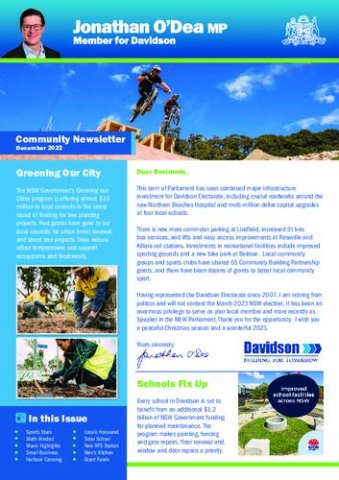Member for Davidson, Jonathan O’Dea has slammed the findings of the Treadstone Report on planning in Ku-ring-gai, released yesterday.
“While the report acknowledges over 5,000 new dwellings have been approved since 2004, it erroneously suggests current plans would only allow for another 5,000 dwellings over the next 20 years,” Mr O’Dea said.
“Based on past experience and my own analysis, the suggestion is simply wrong. The total dwellings allowed for is close to 40% over the required total of 10,000.
“I called for an independent report into the number of new dwellings in Ku-ring-gai more than a year ago – a call which was backed by the local community. The Minister finally agreed, but instead of the resultant Treadstone report providing certainty for the future, it has increased concern and uncertainty,” he said.
“The Treadstone report contains typographic errors and faults in approach, ignoring various concerns over methodology and excluded sites like the Sydney Adventist Hospital site in Wahroonga, previously highlighted to the Minister and in Parliament.
“Amazingly, the report’s author consulted with and relied on views of local developers and the development industry, but makes NO reference to the community groups or local MPs who had raised legitimate concerns.
“Worse, the Treadstone report uses these views to make even more conservative assumptions in order to justify planning for overdevelopment.
“Earlier this month I lodged a Freedom of Information request seeking documentation related to the report, which may provide a better insight into what appears to be a seriously flawed report. I am waiting for the documents.
“I am also writing to the Minister requesting that she consider written submissions lodged in response to the Treadstone Report before considering gazettal of the Ku-ring-gai Town Centres LEP.
“Many people in Ku-ring-gai and NSW understandably think current development, which is dramatically changing the local area character, is excessive and occurring without sufficient controls or supporting infrastructure,” Mr O’Dea concluded.



